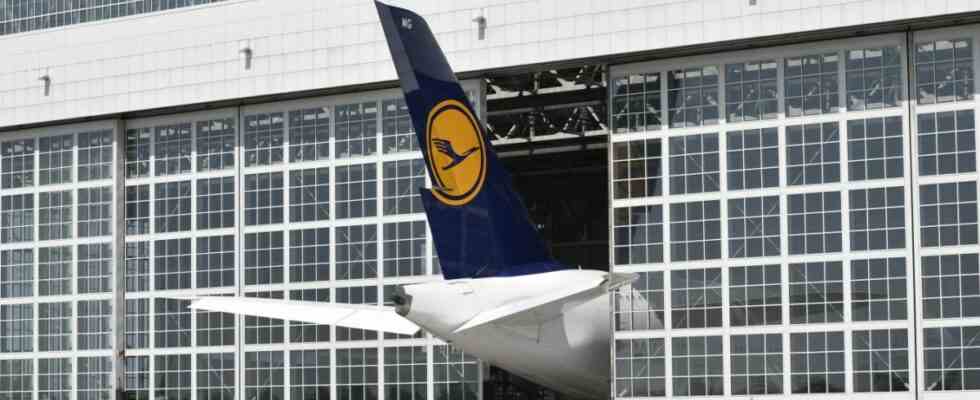For everyone involved, this was a very special flight. An Airbus landed on March 29, 2020 A380 of Lufthansa with the registration D-AIMM at Frankfurt Airport. A good eleven hours earlier, he had started in Bangkok with 459 passengers and 24 crew members. At the time, at the very beginning of the corona pandemic, it looked as if this was the last scheduled flight of the giant Airbus at Lufthansa. As if the temporary halt to long-distance traffic would mean the end of the aircraft type. The 14 aircraft have since been mothballed in Teruel in Spain and Lourdes in France and CEO Carsten Spohr categorically ruled out a return until recently.
A good two years later, the Lufthansa Executive Board wrote a letter to customers who are currently annoyed by the constant chaos at the airports. Of course, Spohr and his colleagues once again apologized for the fact that “the ramping up of the complex air traffic system from almost zero to almost 90 percent is not possible with the reliability, robustness and punctuality that we would like to offer you again”. If things go better again in the coming year, then the A380 be used.
The fact that Lufthansa, airports and suppliers were surprised by how quickly and strongly demand returned after most travel restrictions were lifted can be measured by the airport queues. Short- and medium-haul routes initially benefited from this, but long-haul routes are now also being booked very well again, and at prices that the airlines would not have dared to dream of before the crisis. This, at least Lufthansa believes, changes the calculation for them as well A380.
The operating costs for an A380 flight were low, but sometimes so were the ticket prices
Before the pandemic, Lufthansa had 14 machines of the 500-seater in the fleet. With the passengers was the A380 always extremely popular. They appreciated the comfort, the space and the allure. Traveling in such a huge plane also played a big part. But the airline was never really happy with the giant jet. The operating costs per seat were a little lower than for smaller long-haul jets. Unfortunately, this soon also applied to the ticket prices, because the airline had to sell 500 seats on each flight, which put a lot of pressure on the price. The bottom line was that it didn’t add up and as long-haul growth slowed in 2018 and 2019, the fleet became a real liability.
That’s why it was already decided at that time that it would end in installments. six A380 Lufthansa traded in with Airbus when they bought the smaller and modern A350 reordered. A sub-fleet of only eight machines is very difficult to operate profitably with any aircraft type, so it was actually foreseeable that these would sooner or later be retired. Corona had only accelerated the decision.
There are other reasons for Spohr’s about-face besides the boom in demand, and they can primarily be found in Seattle. 2021 should be the first Boeing 777-9 to be delivered to Lufthansa and then gradually the really big samples like that A380 and the Boeing 747 substitute. Of the 777-9 Lufthansa has ordered 20 aircraft. Officially, they should now be delivered in 2025 because Boeing is having massive problems with approval. It’s quite possible that it will be in 2026. There are also 32 smaller ones 787-9, of which the first copies should have been used in Frankfurt or Munich long ago. Now, with luck, the first should come in August – Boeing has had practically none for two years due to quality defects 787 more delivered.
Many pilots are already missing due to a severance program during the Corona crisis
There lay the recourse to the A380 and other smaller ones A340-600 close, but the action is expensive and complicated. Four of the eight A380 must first go through so-called C-Checks, a particularly intensive regular maintenance, so not all eight will be ready at the beginning of the summer flight schedule in April 2023. It is also unclear where the machines will be stationed, in Frankfurt or Munich. Before the crisis, the fleet was divided between both hubs. Now it will probably be one of the decisive factors where the fastest pilots can be found.
Currently only 14 pilots are eligible for Lufthansa who A380 to fly, all others either have to go to the simulator first or have long since been retrained to other types. the A380 to give to Munich would have the advantage that those stationed there A350-Pilots could also fly the big Airbus jet – the collective agreement allows it 747 and 787 are retrained, go back again, because the A350 is not used at Germany’s largest airport. In any case, it is a nightmare for personnel planning, as pilots are already missing everywhere, partly because of a large severance program that ran during the Corona crisis and was not stopped in time.
Nobody knows whether all the effort will pay off in the end. For this to happen, long-haul demand would have to remain strong in the long term, despite a possible recession, despite the Ukraine war and increased environmental awareness. It’s definitely not worth it for a summer. If 2026 then finally the first ones 777-9 are delivered, the cards will definitely be reshuffled. The oldest LufthansaA380 would then still only be 16 years old, the youngest eleven. On average, aircraft are retired after 25 years.

